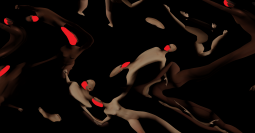What can a body do amidst crisis and contagion?
lecture by Katalin Erdődi
30 September 2020, 6 pm - 8 pm, A4, Karpatská 2 Bratislava
In my talk, originally scheduled for Spring 2020 but cancelled amidst the Covid-19 lockdown, I was planning to address the question: What can performance do?, and trace desire lines for political engagement in performance, through both historical developments and contemporary examples of art practices. However, considering the uncertainties of the current moment, in which we are not yet sure whether an event planned for the end of September can actually take place live, I am compelled to return to the original question at the heart of tranzit.sk's current research cycle: What a body can do.
I feel compelled, because the past months have significantly altered our relationship both to our own bodies and to those of others. We rehearse minute choreographies of washing our hands, observe regulations involving masks and disinfectants, and practice self-discipline and ‘social distancing’. All of these elements have brought an uncanny performativity to our everydays, overwriting the familiar social choreographies of our earlier ‘normality’ while also creating an acute awareness of the interdependency and interconnectedness of our lives and bodies. Many of us have experienced absence and alienation, and felt disembodied and disengaged, while yearning to reach out and touch one another. At the same time, the crisis ensuing from the pandemic has exposed and exacerbated deep systemic inequalities, both globally and locally, devastating livelihoods while also abandoning people, in particular vulnerable communities, to deal with the virus as best they can. The cynical bio- and necropolitics of governments, combining insufficient crisis response with increased surveillance and control, have sparked protests and social unrest in many countries, with people taking to the streets despite the risk of infection.
What can a body do amidst crisis and contagion?
Can performative practices inspire and enable us in not only resisting and surviving, but also ‘being-with’ these conditions of heightened precarity and vulnerability? How can performance as a relational practice create other forms of togetherness? What can performance do when live gatherings and assemblies are suspended; when bodies cannot come together in actual physical space and when proximity and intimacy are hindered or strictly regulated, seeing as they pose potential health risks?
In my talk I will discuss artistic practices, such as Tehching Hsieh’s durational one-year performances, or the Telepathic Movement sessions proposed by Paul Dunca, Farid Fairuz, Maria Moria, Cristian Naculescu and Alexandra Pirici during the pandemic, alongside research-led approaches, such as the work of the London-based nanopolitics group, which formed around a desire to bring politics to the body and vice versa. In so doing I would like to grapple with how we can understand the rupture caused by the Covid-19 pandemic and the socio-political developments unfolding around it, with and through the body, and invite you to participate in a collective reflection and discussion.
Katalin Erdődi is a Vienna-based curator, dramaturg and researcher in the fields of contemporary art and performance. Her interests include experimental performative practices, politically engaged artistic and curatorial strategies, and art in public space, understood in the broadest sense as social, architectural, and discursive space. Central to her work is experimentation with diverse formats, from performance through exhibition-making to collaborative, context-responsive and process-oriented approaches. Erdődi has worked for art institutions and festivals, such as steirischer herbst (Graz), brut/imagetanz festival (Vienna), GfZK - Museum of Contemporary Art (Leipzig), and Trafó House of Contemporary Arts (Budapest). Her independent curatorial projects include collaborations with artists, such as Alicja Rogalska (News Medley, 2020-21, Budapest/Kartal), Antje Schiffers (I like being a farmer and I would like to stay one, 2017-18, Hungary), Núria Güell (Enjoy Austria, 2016, Vienna) or the finger group (Social Honey, 2013, Budapest), alongside events and festivals, such as politics of the small act (2012, Leipzig) and PLACCC Festival, an international festival for site-specific performance and art in public space (2008-2011, Budapest/Pécs).
Event will be held in English. It is part of the cycle entitled What a Body Can Do? initiated by Juraj Mydla in cooperation with tranzit.sk.
Visitors are kindly asked to follow the actual anti-pandemic measures during the event.
ERSTE Foundation is main partner of tranzit. Supported using public funding by Slovak Arts Council.
